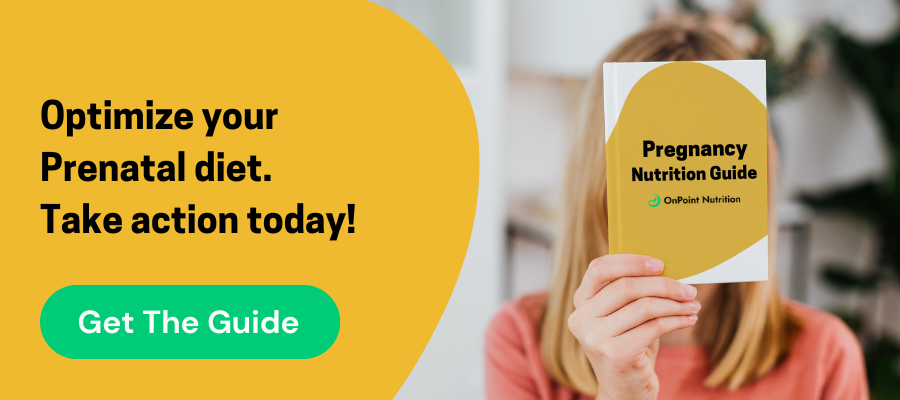
Eating a healthy, well-balanced diet is crucial for the health of moms-to-be and their babies. Focus on eating a varied diet that contains nutrient-dense foods such as fruits, vegetables, complex carbohydrates, lean proteins, and healthy fats. Additionally, there are key nutrients that help nourish you and your baby through this important time in both of your lives.
While there are many foods that are beneficial during pregnancy, some foods may be detrimental to you and or your baby. These foods should be limited or avoided for optimal health. As with most health concerns, especially during pregnancy, it is best you talk with your doctor or dietitian about how to have the healthiest pregnancy possible.
High-Mercury and Uncooked Seafood
Although fish and shellfish are good sources of protein, healthy fats, and iron, there are risks of consuming certain types of seafood while pregnant. Some seafood is high in mercury, which may harm the development of your baby’s brain. Shark, swordfish, king mackerel, marlin, and tilefish are all considered high mercury fish and should be avoided. Any uncooked fish or shellfish is also considered risky because it may contain bacteria or viruses that could be dangerous for your baby. It is best to avoid raw oysters, sushi, sashimi, and lox. When cooking seafood, be sure to cook to an internal temperature of 145 degrees to avoid foodborne illnesses.
These recommendations should not scare you away from all fish during pregnancy. It is recommended that pregnant women consume between 8 and 12 ounces of low mercury seafood each week to obtain the recommended amount of omega-3 fatty acids, specifically docosahexaenoic acid (DHA) which is crucial for the development of your baby’s brain. Safe fish choices include salmon, cod, tilapia, haddock, shrimp, and canned light tuna.
Raw or Partially Cooked Meat, Poultry and Eggs
Like seafood, undercooked meats, poultry, and eggs increase the risk of foodborne illness. Food poisoning while pregnant has the potential to be more severe than when not pregnant, and may affect your baby, too. However, meat, poultry, and eggs are dense sources of protein, iron, and other vitamins and minerals that benefit your growing baby.
To be safe, whole cuts of meat should be cooked to 145 degrees Fahrenheit, ground meats should be cooked to 160 degrees Fahrenheit, and chicken and other poultry should be cooked to 165 degrees Fahrenheit. If you choose to consume deli meats, cook them until they are steaming to prevent Listeria, a rare, but serious foodborne illness. Eggs should be cooked until both yolks and whites are firm in order to protect against potential salmonella exposure.
Unpasteurized Dairy and Soft, Mold-Ripened Cheeses
As with meat and fish, dairy products are good sources of beneficial nutrients for you and your baby. Specifically, dairy is high in protein, calcium, and vitamin D and should be included in your diet, as tolerated, while pregnant. However, unpasteurized dairy products carry a higher risk of foodborne illness and should be avoided. Soft cheeses including brie, feta, blue cheese, gorgonzola, and camembert all carry a higher risk of infection as well.
Unwashed Produce
Fruits and vegetables are nutrient-dense foods that we highly recommend during pregnancy. Be sure to wash all produce thoroughly to avoid potential infection. Raw sprouts including alfalfa, clover, radish, and mung bean carry an elevated risk of infection and should be cooked thoroughly before consuming while pregnant.
Caffeine
Research suggests limiting caffeine during pregnancy is beneficial. However, there is no concrete limit set on caffeine intake. Most health care providers recommend limiting your intake to a maximum of 200 milligrams of caffeine daily while pregnant. A standard 8-ounce cup of coffee contains about 95 milligrams of caffeine where the standard 8-ounce cup of tea contains 47 milligrams of caffeine. Caffeine levels in coffees and teas vary greatly, so read the food labels on each product carefully.
Alcohol
Alcohol consumption is not considered safe during pregnancy. This is because alcohol in your blood passes easily to your baby through the umbilical cord. Avoid alcohol entirely, as it has been linked to higher risk of miscarriage, stillbirth, fetal alcohol syndrome, facial deformities, and intellectual disabilities.
Throughout Pregnancy
While most of our recommendations are consistent throughout your entire pregnancy, we emphasize specific recommendations based upon your pregnancy stage.
First Trimester
During the first trimester your baby is just starting to grow and develop. Avoiding all the foods and beverages discussed above is important to your baby’s overall health. Additionally, it is important not to consume too much vitamin A during early pregnancy. Too much vitamin A can cause birth defects or be toxic to your baby because his or her liver has not developed and cannot process this vitamin. It is unlikely you will consume too much vitamin A from day-to-day foods, but be mindful of the supplements you are taking, which pose a higher risk of vitamin A toxicity. Additionally, if you choose to consume liver meat, your risk for overconsuming vitamin A also increases.
Second Trimester
In the second trimester, all the above recommendations also apply. As you move further into pregnancy, your calorie and nutrient intake should continue to increase. Oftentimes, nausea and food aversions from the first trimester start to go away during the second trimester. As you are able, consume foods from all food groups to nourish your body, as well as your baby’s body.
Third Trimester
During the third trimester, your caloric and nutritional needs continue to increase as your baby continues to grow and develop. Continue to avoid the foods above and focus on a healthy, well-balanced diet. During the third trimester, you may also find it helpful to eat more frequent meals to ensure you are getting full nutrients each day. You may also consider limiting fried and spicy foods at this point in pregnancy, as heartburn and indigestion are more common in the later stages of pregnancy.
Putting it All Together
There are many recommendations of what to eat and what to avoid during pregnancy. However, it is important to discuss the recommendations above with your doctor to ensure you are setting yourself up for the healthiest pregnancy.

Topics

Liz has been reading nutrition labels since she learned how to read. Growing up with severe peanut and tree nut allergies she learned that it’s important to know what you are putting into your body. She made her first big lifestyle change as a freshman in high school, when she decided to become a vegetarian. However, it wasn’t until she took a food class in Italy as part of a study abroad program in college that it clicked in her mind that she wanted to make food and nutrition her career. Liz graduated from Penn State University in 2015 with a bachelor's degree in Nutrition, as well as a bachelor's degree in Marketing. She completed her dietetic internship with Aramark in Philadelphia, and her master's degree at Northeastern University shortly after.




